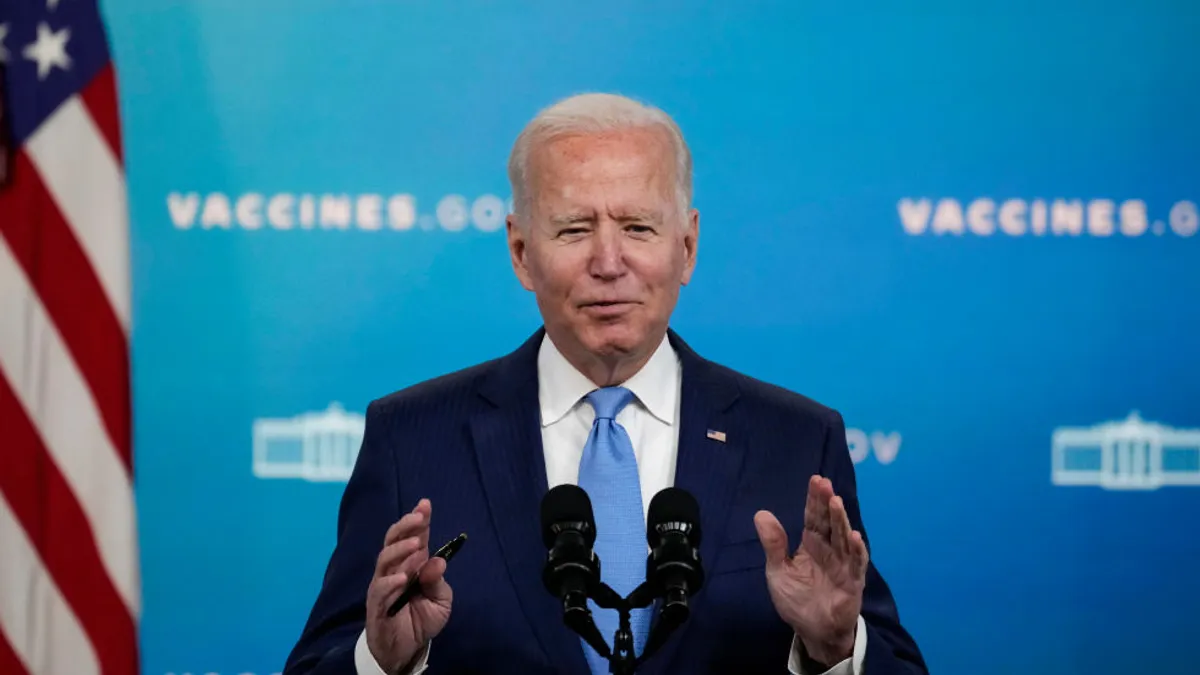Dive Brief:
- At a press briefing Aug. 24, the White House COVID-19 Response Team encouraged employers to adopt vaccination requirements as a means of more swiftly bringing the pandemic to an end. "If you're a business, a nonprofit, a state or local leader who's been waiting for full and final FDA approval before you put vaccination requirements in place, now is the time," Jeff Zients, White House COVID-19 response coordinator, said at the briefing.
- The announcement was spurred by the U.S. Food and Drug Administration's full approval of the Pfizer-BioNTech vaccine, which previously was approved only under emergency use authorization, Aug. 23. "As the first FDA-approved COVID-19 vaccine, the public can be very confident that this vaccine meets the high standards for safety, effectiveness and manufacturing quality the FDA requires of an approved product," Acting FDA Acting Commissioner Dr. Janet Woodcock said in a statement released by the agency.
- The briefing is the most recent in a series of steps the White House has taken to increase the rate of vaccinations. On July 29, President Joe Biden mandated that federal workers sign forms confirming they'd been vaccinated or face mandatory masking, testing, social distancing and other protocols. Members of the U.S. military will be required to get the COVID-19 vaccine beginning in September. And most recently, the Biden administration has required staff at nursing homes participating in the Medicare and Medicaid programs to be vaccinated.
Dive Insight:
With the wrench the delta variant has thrown into recovery from the pandemic, public opinion has begun to turn on vaccine requirements.
In a special report released by The COVID States Project, researchers compared the June/July survey responses to responses to same questions in their April/May survey, finding that support for the four types of mandates suggested — government mandates for everyone, mandates for boarding an airplane, mandates for school attendance and mandates for university attendance — has risen among almost all subgroups surveyed. Majorities of all subgroups support a universal mandate, with the exception of Republicans, 45% of whom support the policy.
Businesses are warming to vaccine requirements as well. As recently as a few months ago, 83% of employers responding to a Fisher Phillips pulse survey said they were not considering a mandate, with most encouraging workers to get the vaccine instead. But by August, several big-name companies had come forward with vaccine mandates, including Google, Walmart, Microsoft and Tyson Foods, which may set the tone for other businesses moving forward. In early August, CNN reportedly fired three unvaccinated employees who showed up on-site in violation of its vaccination mandate.
More broadly, job board Indeed released an August data analysis which found that job postings requiring COVID-19 vaccination had increased 34% by the end of the first week of August compared to one month prior. Engineering, accounting, retail and marketing were among the fields that saw large increases in vaccine requirements.
Employers still have choices in how they institute their COVID-19 policy, legal experts recently told HR Dive, but consistency and transparency are crucial to keeping out of legal trouble. For those considering mandates, employers should consider the specific circumstances of their own workplaces and make sure they're aware of religious and disability accommodations required under federal law, legal experts said.













